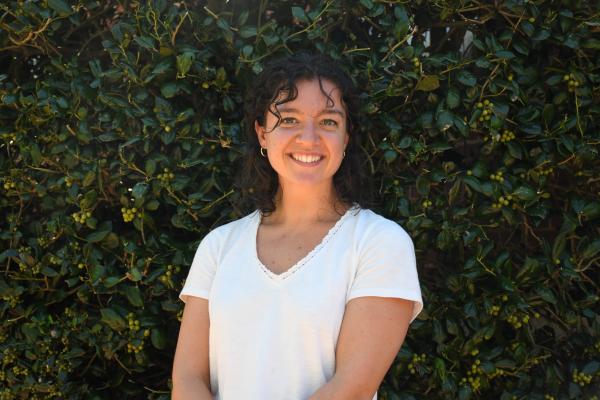
FPG Announces 2024 James J. Gallagher Dissertation Award Recipient
Julia Mackessy has long been fascinated by the subject of birth. She recalls coming home from grade school and watching the reality television series, “A Baby Story,” which follows couples through their final weeks of pregnancy, in the delivery room, and the first weeks of the baby’s life. With the thought of becoming a midwife, Mackessy trained as a doula while a senior at the University of Notre Dame and spent two years after graduating college providing guidance and support for those giving birth.
So, it is not surprising that Mackessy chose to conduct her doctoral dissertation research on the impacts of birth experiences for maternal and infant health in the Appalachian region of western North Carolina. A graduate student in the department of anthropology at the University of North Carolina at Chapel Hill, Mackessy was recently named the winner of the 2024 James J. Gallagher Dissertation Award from the UNC Frank Porter Graham Child Development Institute (FPG). The award—which honors the legacy of the late Jim Gallagher, FPG director from 1970 to 1987—provides a $4,500 stipend for a work-in-progress that is reflective of Gallagher's legacy of advancing policy and practice that supports children and families.
In her dissertation research, Mackessy will look qualitatively at birth experiences and expectations of her subjects and examine how that affects responses in the early post-partum period. She notes that mothers and infants in western North Carolina are experiencing shifts in their prenatal, perinatal, and postpartum environments because of significant changes in maternal and infant care due to the closure of labor and delivery wards in the region and lack of clarity on the legality around the use of midwives for obstetric care.
This results in ill effects among babies and mothers, who are already at higher risk for poor birth outcomes compared to other regions of the country. Mackessy will explore the connection between having mothers’ needs and desires met during pregnancy, birth, and postpartum and maternal and infant health outcomes such as maternal mental health, breastfeeding, and maternal-infant bonding.
Few studies have looked at the pathways through which maternal experience of the prenatal, perinatal, and postpartum process may contribute to the higher rates of negative outcomes in the U.S., specifically in the Appalachia region. By using interdisciplinary research methods and questions that combine biocultural and medical anthropology theory with biological and qualitative methods, Mackessy will examine these factors.
Her research aims include:
- understanding if expectations for birth are associated with stress levels in women during pregnancy and if expectations influence the birth experience;
- exploring the associations between a mother’s birth experience and maternal and infant cortisol levels (a marker of stress regulation) in the six to14 days postpartum; and
- examining whether the birth experience is associated with maternal dysregulation of the neuroendocrine system and whether this is associated with maternal mental health, maternal-infant bonding, and infant cortisol levels at three months postpartum.
Mackessy hypothesizes that women who have more negative experiences in the prenatal, perinatal, and postpartum period due to a lack of care or not being able to receive the kind of care they want will have higher rates of anxiety and depression, lower rates of maternal infant bonding, higher rates of cortisol and show dysregulated stress responses in the early postpartum period compared to women who have more positive experiences.
She intends to recruit 120 participants for the first study visit and expects that with attrition, she will end up with 60 new mothers by the end of her planned third visit.
Mackessy will use the Gallagher Award funds to reimburse participants, with each research subject receiving a $20 gas or Amazon gift card for each completed study visit.
Mackessy is aware that collecting data at what is a sensitive time may pose some ethical problems. She is hopeful that her training and work as a doula benefits the mothers she meets with at their second visit, at six to 14 days postpartum, and then at three months postpartum. With her skills and experience with birthing, and growing knowledge of community resources in the Blowing Rock area, she plans to be a resource, especially for moms who seem in distress.
In the Gallagher Award recommendation letter she wrote for Mackessy, Amanda Thompson, PhD, MPH, professor and chair, UNC Department of Anthropology and professor, Department of Nutrition in the UNC Gillings School of Global Public Health, comments on Mackessy’s considerable research experience including a qualitative study she conducted of birth experiences of women delivering at UNC and area hospitals to pilot the methods and feasibility of her proposed dissertation research, focusing on the impact of labor interventions on subsequent health of mothers and babies postpartum. Calling Mackessy “an outstanding graduate student,” Thompson expects her “to develop a novel dissertation project that will shed light on the factors shaping infant development and also that will have policy implications around health care services in the peripartum.”
That is Mackessy’s hope as well. She says that that being on the ground in the community will provide her with insights on policy changes desired by the community instead of ones that researchers think are needed. She believes that changes in state policy around mid-level practitioners, such as midwives, could be hugely impactful in rural areas.
Mackessy says that winning the Gallagher Award is validating as a researcher. “I was grinning ear-to-ear when I received the award,” she says. “I look forward to having it support my research.”